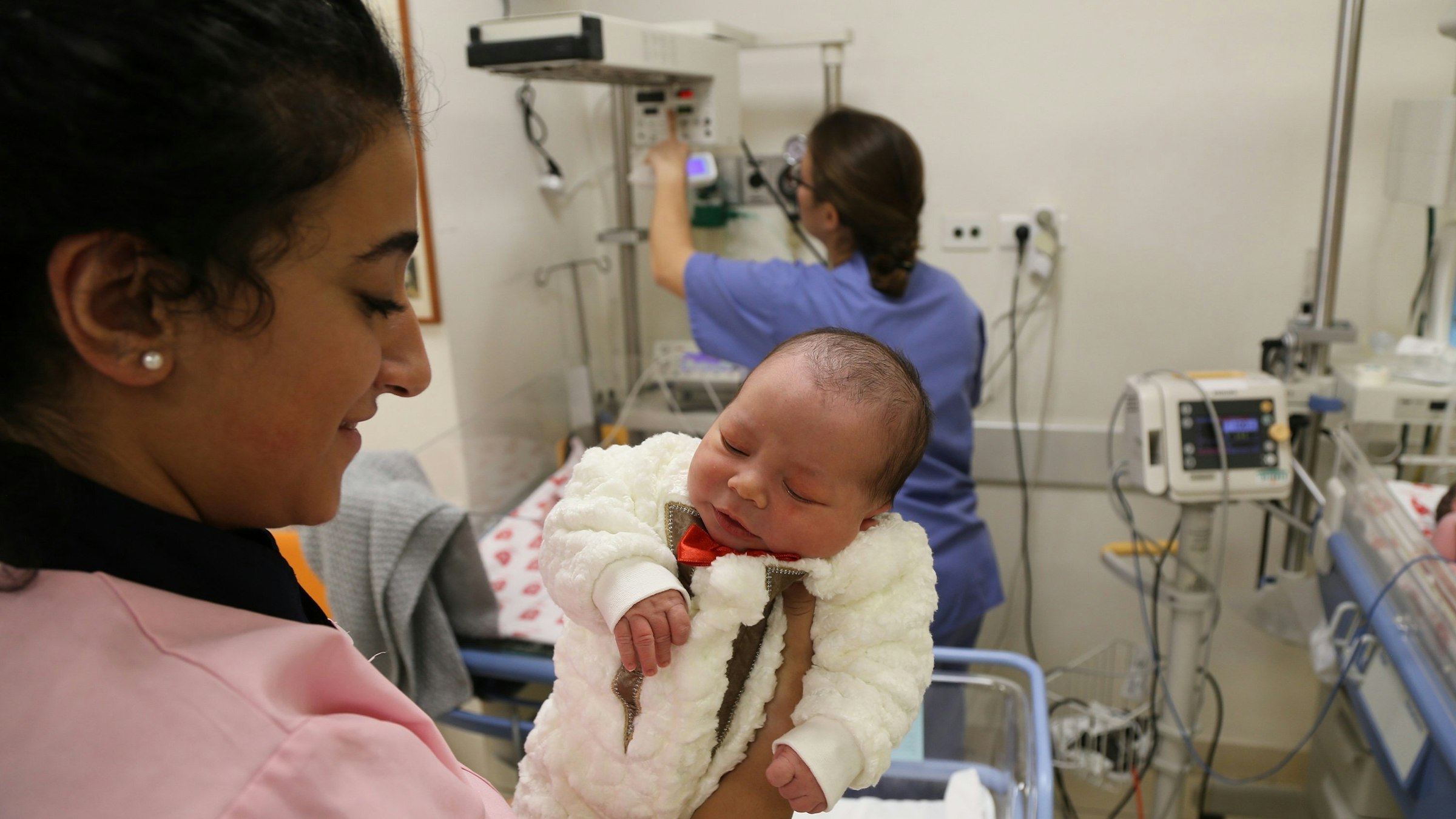(OSV News) -- The Holy Family Hospital in Bethlehem, located just 1,500 steps from the birthplace of Christ, is confronting significant challenges amid the ongoing war between Israel and Hamas in the Gaza Strip 45 miles away.
The hospital, the premier maternity hospital and neonatal critical care center in the Bethlehem region of the West Bank, has been facing difficulties in its ability to operate, struggling to ensure the delivery of essential medical services since the outbreak of the war Oct. 7.
Israel launched a military assault on Hamas after Hamas terrorists from Gaza breached a security fence on Israel's southern border Oct. 7, killing 1,200 people, and kidnapping almost 240 people, including babies and elderly, of whom only a fifth made it safely home as of Nov. 28.
As war erupted, roadblocks were put up and checkpoints closed in the West Bank, making it difficult for medical supplies such as pharmaceuticals, epidural kits and highly specialized baby formula to reach the hospital, Order of Malta Ambassador to Palestine Michèle Bowe, president of Holy Family Hospital Foundation told OSV News in a phone interview.
Prices for the medical supplies also increased dramatically, she told OSV News. All this has put the hospital's ability to fully serve the community at risk.
The hospital, a charity institution, delivers approximately 5,000 babies annually and provides 150,000 services, including a crucial mobile clinic -- which, until the war, went out daily to reach women in isolated West Bank villages -- a gestational diabetes clinic and the only menopause clinic in the West Bank. They treat close to 20,000 patients a year, from the areas of Bethlehem, Hebron, Jericho and smaller villages.
Because of the tense political situation, overwhelmed hospital staff were preferred not to have media visitors at the hospital at the time of the interview.
"We are the only hospital in the West Bank that can deliver and care for babies as small as one pound and serve a catchment area of around 1 million people," said Bowe. "We have a Level 3 NICU and some babies at the unit are born really small -- as small as one pound. They need a highly dense caloric formula, which is very expensive, but it is the difference between a baby surviving and a baby not surviving or surviving poorly."
At the time of the Nov. 14 interview, they were waiting for the delivery of infusion pumps needed to deliver intravenous medicine to women and babies and a sonogram machine, much needed to check on unborn babies and to monitor babies' organs once they are born.
The hospital relies heavily on donations, and though patients are asked to contribute for services they receive, the hospital subsidizes services by 50%, said Bowe. However, the closures and uncertainties about subsidies from organizations such as UNRWA -- United Nations Relief and Works Agency for Palestine Refugees in the Near East -- and the Palestinian Authority, which normally contribute to patient care but are now redirecting funds for Palestinians in Gaza, have strained their financial situation, she said.
To further exacerbate the situation, since the economy of Bethlehem is based on pilgrimages and tourism, 90% of the workforce is not receiving salaries now, so fewer patients are able to contribute toward their care.
Already practiced in working under stressful conditions following the second intifada and the COVID-19 pandemic, the staff went into emergency mode, splitting work schedules so people would not have to travel to or from work in the middle of the night, and trading residents with other hospitals so each resident would be working closer to their home.
"The one thing our staff is, is extremely resilient and resourceful," said Bowe. "We have to rely on ingenuity to work."
One of the biggest concerns now is any need for surgeries for the NICU babies since the hospital is not equipped for that. Normally, they'd transfer the babies to an Israeli hospital with payment subsidized by the Peres Peace Center for Peace and Innovation. Israeli surgeons would treat the babies while waiving their fees. But under the current situation, the center will not be able to help with funding this year.
Before the outbreak of the war, a baby born with the valves in his heart transposed was at an Israeli hospital undergoing lifesaving cardiac surgery within eight hours of birth, but now staff members hold their breath every time a mother comes in with a complicated pregnancy, Bowe said.
"They are praying that the baby who is born will not need surgical intervention. The situation is not like it was before, where they could transfer the baby for care," she said.
But as the Christmas season approached, Bowe said she preferred to remember the recent birth of a baby aptly named Amal (hope in Arabic) to a young mother, Nadeem, who came to the hospital after realizing she hadn't felt the baby move for a significant amount of time.
Already parents of two older children, she and her husband had waited for some time for their third baby. She was afraid of having an expensive hospital bill and no baby to bring home, but when she told her husband, he rushed her to Holy Family Hospital. There, medical staff jumped into action and performed an emergency cesarean section. At first, the baby was gray and unresponsive, but the staff did not give up and finally the little girl let out a tiny cry and she was brought to the NICU."
Nadeem said it was the prayers of her children that saved her baby. She couldn't stop thanking the staff for the gift of life and of hope the baby brings," said Bowe. "The birth of her baby brought her hope in this time of terrible war and the loss of so many lives. There is a new baby in Bethlehem and it gives her hope that this will pass."










